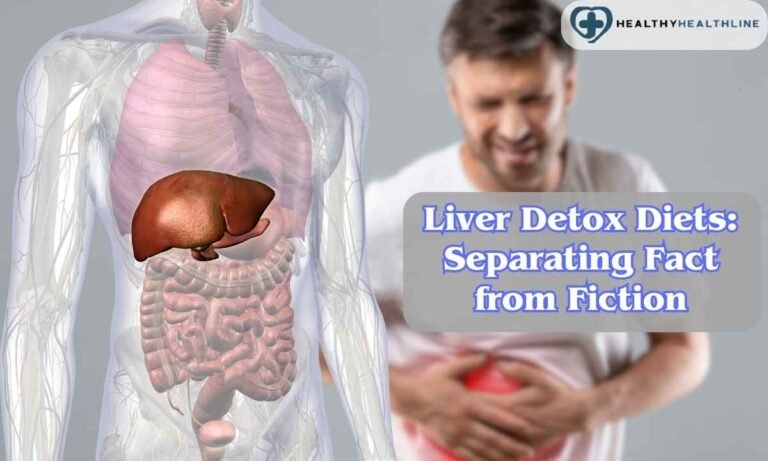The word “detox” has gained popularity in today’s health-conscious culture. You will be bombarded with advertisements for “liver detox” teas, juices, and supplements if you visit any wellness store or browse social media. Every wellness influencer will have different methods of liver detoxing. The concept is alluring: by drinking this, you will rid your liver of toxins and become healthier, lighter, and more energized. The true story, however, is much more empowering and far less glamorous. Medical professionals stress that these methods can be deceptive in addition to being needless. In reality, your liver is an extremely effective detoxification system that can function without the aid of fad remedies or strict diets.
Debunking the Liver Detox Myths
Juice Cleanse
The use of juice cleanses as a liver detoxification technique has gained popularity in recent years. Every other influencer on Instagram is talking about how juices detoxify the liver. However, that is a myth. Juices can offer certain vital nutrients, but they don’t contain all the ingredients needed to assist the liver’s detoxifying activities completely. The key to giving the liver the nutrients it needs for the best detoxification is eating a balanced diet that contains a range of entire foods.
Detoxicating Supplements
Marketers frequently promote supplements for liver detoxification as a quick and simple method of liver cleansing. Nevertheless, the truth is that most people do not need these supplements. Although some supplements may contain components like milk thistle or turmeric that might promote liver health, people shouldn’t rely on them as the main strategy for liver detoxification. It’s crucial to keep in mind that maintaining liver health starts with leading a healthy lifestyle that includes regular exercise and a balanced diet.
The Liver: Your Natural Detox
The liver is a remarkable organ that carries out a number of essential physiological functions, including detoxification. Processing and removing toxic chemicals from the bloodstream is its main function in detoxification. The liver uses a two-stage detoxification procedure to accomplish this.
During the initial stage, referred to as the “activation phase,” the liver’s enzymes transform harmful compounds into intermediate metabolites. Compared to the original toxins, these metabolites are frequently more reactive and possibly dangerous. The liver further alters these metabolites during the second stage, known as the “conjugation phase,” which makes them less harmful and simpler for the body to get rid of.
Every day, without the aid of supplements or special diets, your liver purifies your body. Your healthy liver may handle the majority of toxins that enter your body from food, drink, or the environment.
How to Keep Your Liver Healthy?
A Balanced Diet
Make sure your diet includes fruits, vegetables, nutritious grains, lean meats, and healthy fats. Include foods that are good for the liver, such as turmeric, beets, garlic, and leafy greens. Avoid consuming highly processed foods, sugar-filled beverages, and excessively fried food.
Regular Exercise
One of the main causes of metabolic-associated fatty liver disease (MASLD), which can harm your liver covertly, is obesity. Your risk of non-alcoholic fatty liver disease (NAFLD) is decreased by physical activity, which also helps you maintain a healthy weight and lessens liver fat accumulation.
Limit Alcohol
Alcohol is one of the primary causes of liver disease, which includes cirrhosis and fatty liver. Either drink a considerable amount of alcohol or give up on it entirely.
Hydration
Drinking enough water aids in the kidneys and liver’s natural elimination of waste. You don’t need alkaline or cucumber-kombucha water, just clean normal water can do the trick.
Keep a Check of Your Sugar Levels and Medications
A fatty liver and even liver failure can result from uncontrolled diabetes. Medication compliance and routine examinations are essential. Your liver may be strained by medications such as acetaminophen (paracetamol), some antibiotics, and even herbal medicines, particularly if taken frequently or in large quantities.
Signs You Need To See Your Doctor
You may have an underlying liver disease if you experience symptoms like exhaustion, jaundice (yellowing of the skin or eyes), unexplained weight loss, or abdominal pain. Alcoholic or NAFLD-related fatty liver diseases, Pneumonia A, B, or C, Cirrhosis, and liver cancer are some common liver problems. Results can be significantly impacted by early diagnosis and treatment.
You can also Read about:


